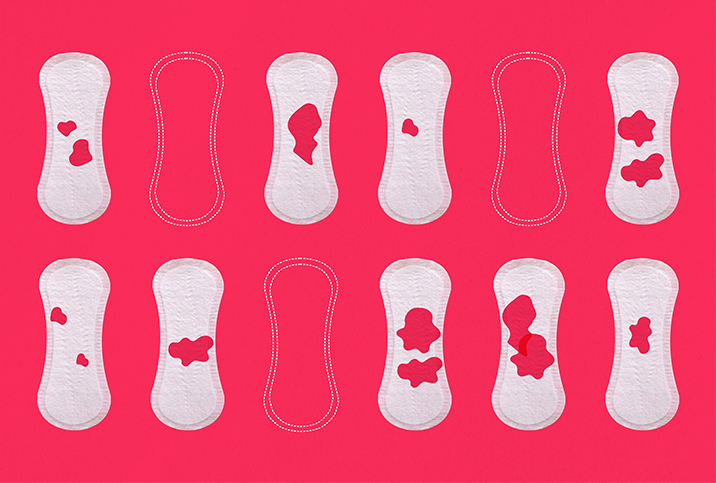Get Ready for Second Puberty

Many of us would rather spend a week locked in a rat-infested cabin with no windows, Wi-Fi or running water, with only circus peanuts for sustenance and an endless loop of "My Humps" by the Black Eyed Peas over a loudspeaker for entertainment than endure puberty again.
Fortunately, the nightmare of adolescence is a one-and-done, but the body and mind do undergo subsequent changes in adulthood that are sometimes colloquially referred to as "second puberty." These shifts are not as substantial as the ones that occur during puberty, but they can significantly impact multiple facets of health and well-being.
"As we age, we may experience different hormonal shifts throughout various stages of life," said June Gupta, N.P., senior director of medical services at Planned Parenthood Federation of America in Washington, D.C. "This can mean producing more or less of a specific type of hormone due to changes that come with aging."
In your 20s
In many ways, your body is the fittest it will ever be in your 20s. In the first years of this decade, you may feel invincible, capable of pulling all-nighters and partying for days with little consequence other than a questionable TikTok post or two. Bone mass and muscle strength are at their respective zenith, and fertility peaks during this stage, along with levels of estrogen and testosterone for women and men, respectively.
As a result of increased estrogen, women tend to have shorter, more regular periods compared to their first few years of menstruation, along with increased vaginal discharge.
"Discharge is a way of keeping the vagina clean and healthy," said Tania Adib, B.Sc. M.B.B.S., a consultant gynecologist and gynecological oncologist based in London. "It allows all the bad bacteria to come out. So vaginal discharge is a really healthy, normal phenomenon."
Due to social and hormonal factors, people may have stronger libidos and more sexual experiences in their 20s, according to Adib and Jonelle Samuel, M.D., division chief of gynecology and gynecologic surgery at Luminis Health, based in Bowie, Maryland.
"Younger women in their 20s tend to have a higher sex drive as this is physiologically the best time to conceive and have a baby," Samuel said. "This is what people may refer to as the 'biological clock,' which actually denotes the physiological changes that a woman's body goes through as she prepares for a pregnancy."
Having more sex may be great, but it is not without risks, including increased vulnerability to sexually transmitted infections (STIs) and unplanned pregnancy, Adib noted. As a result, using contraception and undergoing regular STI testing is essential.
Other potential downsides of the decade include acne—another product of hormones—and a heightened likelihood of developing disorders, such as lupus or hormone-induced vulvodynia (vulval-vaginal pain), which tend to emerge around this time, Samuel added.
In your 30s
Aging has plenty of perks, but in terms of physical health, it's pretty much all downhill from here.
You may be more easily fatigued than in the decade prior, while bone and muscle mass decline and your skin begins to wrinkle and sag. What you used to drink for the pregame is now more than you can stomach in a night without a three-day hangover, and you're beginning to get white hairs in unwelcome places as well as persistent back pain.
Fertility significantly declines, too, particularly for women, according to Alyssa Dweck, M.S., M.D., a gynecologist in Westchester County, New York, and a sexual health and reproductive expert for Intimina, a Swedish women's intimate health brand.
"The most significant decline in fertility occurs at 35, but diminished potential can occur as early as 30 to 32 or even earlier due to medical or surgical issues," Dweck said. "This is a common reason for many to pursue cryopreservation at this age."
Cryopreservation is the process of freezing and storing fertilized eggs for later use.
Biological females are born with their full complement of eggs, and new ones are not produced, Dweck and Samuel explained.
"With aging, these eggs also become 'older,' thereby increasing the risk for abnormal chromosomes and increasing the likelihood of concomitant conditions, which can make
fertility more difficult," Samuel said. "These conditions may include uterine fibroids, endometriosis and chronic diseases such as high blood pressure."
Women also may experience pelvic floor dysfunction in their 30s—particularly if they've given birth vaginally—which can lead to incontinence, Adib explained.
In the latter half of the decade, perimenopause, or the transition to menopause, may begin for some women.
"Perimenopause is the time leading up to menopause where you may begin to experience early symptoms of menopause," Gupta said. "This stage can last anywhere from a few months to up to 10 years, and symptoms may be on and off throughout. Perimenopause usually begins in your 40s, but it can start earlier, too."
In your 40s
People undergo additional hormonal shifts in the fourth decade of life, leading to various changes, from increased belly fat to more ear hair and, typically, an earlier bedtime. Due to diminished space between the spinal vertebrae—a result of wear and tear and loss of bone mass—you may become a little bit shorter, too. Most people lose about half an inch of height each decade after age 40.
Fertility takes a hit, too. Although men continuously produce sperm throughout their lifetime, the quality diminishes with age, according to Dweck and Michael Werner, M.D., the medical director and founder of Maze Men's Sexual & Reproductive Health, based in New York City and Purchase, New York.
"In general, fertility starts to decline for men when they're in their late 40s, with up to a 23 percent annual decline in fertility beginning at age 39," Dweck said.
"What's happening with sperm is you have the original group of cells and they're dividing and splitting, and any time cells split, there's always a chance for mutations to arise. Those mutations, called point mutations, sort of take over the whole group of dividing cells," Werner explained, noting that the rate of mutation increases dramatically over time. "Between 20 and 40, there are two times as many point mutations. And so we know that men who are over 40 have more children with genetic abnormalities and behavioral and psychiatric issues."
Also around age 40, testosterone declines by about 1 percent to 3 percent each year, Werner said.
"It's not insignificant the way it falls," he added, noting that as a result, men may exhibit symptoms such as decreased energy and libido, difficulty losing fat or gaining muscle, and erectile dysfunction (ED). Research indicates about 40 percent of men experience some degree of ED in their 40s, and that number increases by about 10 percentage points per decade, according to Werner.
"I think every man has to understand that if he is lucky enough to live long enough, he will almost for sure start having problems at some point with erection issues," Werner said. "It's almost like, if you reach 45, you'll probably need reading glasses. People don't get so uptight about reading glasses, but men are somehow dumbfounded, dismayed and feel terrible when they start running into erection issues. But that's just par for the course. Fortunately, we live in the 21st century and if you have a penis, we can get you an erection."
Sexual health challenges tend to be equally or more prominent in women during this decade. For people who've given birth vaginally, incontinence and prolapse may occur or worsen, Adib noted. And perimenopause goes into full swing, with some entering menopause. Gupta and Dweck explained that menopause typically occurs in a person's late 40s or early 50s but can happen earlier.
Although it's a natural phenomenon marking the end of a person's reproductive years, menopause can be medically induced through cancer treatments or surgical removal of the ovaries, Gupta added.
"Menopause begins when the ovaries stop producing estrogen and produce less reproductive hormones such as progesterone," she said. "This causes menstrual cycles to end. Once you have not had a period for 12 months, it is defined as menopause. At this point, you can no longer become pregnant."
Symptoms vary from person to person but commonly include irregular periods, hot flashes, vaginal dryness and mood swings.
"Unlike with menopause, you can still become pregnant during perimenopause, so it's important to continue your preferred method of contraception if you do not want to become pregnant," Gupta noted.
Menopause causes a dip in testosterone, Adib said. Along with a loss of vaginal lubrication and elasticity resulting from decreased estrogen—which can make sex painful—this decline can substantially affect libido. Although most menopause symptoms subside without intervention, vaginal dryness does not, she noted. However, there are several treatment methods, including lubricants and hormone replacement therapies (HRT).
"Hot flushes may come and then go, but vaginal dryness only gets worse if it's not treated," Adib added.
"Hormonal changes do not have to mean that your interest in sex is altered or gone," Gupta said. "If you lose interest in sex at any time and this is bothersome to you, check with your healthcare provider to talk about ways to help."
How to prepare for second puberty
Gupta and Samuel noted that everyone's experience and symptoms vary. Likewise, various physiological, socioeconomic, psychological and individual factors can influence how these changes present and how they affect you. Generally, experts say embracing the aging process and prioritizing well-being can make coping with changes easier.
"Embrace the physical changes that occur and enjoy each stage of life," Samuel said, adding that she recommends people "give themselves some grace as well."
Although age-related changes are natural, they can also be disruptive, Gupta acknowledged. To assuage some symptoms and preserve overall health, each of the experts recommended adopting healthy lifestyle habits, including a balanced diet, regular exercise routine and stress-reduction practices such as meditation or yoga. It's also a good idea to discuss any challenges with a healthcare professional.
"Focus on lifestyle as early as possible, including diet, exercise and stress reduction," Dweck said. "Education is key. Speak to and count on your healthcare provider to help navigate issues of concern. We are definitely more comfortable speaking about subjects that were previously considered taboo, including gynecologic health, sexual health and menopause."
A healthcare provider can also rule out any potential underlying health conditions, such as polycystic ovary syndrome (PCOS) or a thyroid disorder which could be causing or exacerbating certain symptoms.
Finally, experts advised that you should talk to your partner(s) about any changes and challenges you're experiencing.
"It may help to be open and honest with your sexual partner[s] about your experience of sex during hormonal shifts," Gupta said. "Sex should be fun and pleasurable, and no one should ever feel pressured into having uncomfortable or painful sex."


















